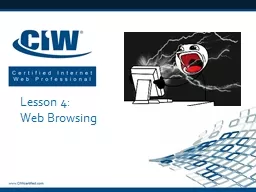PDF-An Analysis of Private Browsing Modes in Modern Browsers Gaurav Aggarwal Elie Bursztein
Author : jane-oiler | Published Date : 2014-12-26
We 64257rst pro pose a clean de64257nition of the goals of private browsing and survey its implementation in different browsers We conduct a measurement study to
Presentation Embed Code
Download Presentation
Download Presentation The PPT/PDF document "An Analysis of Private Browsing Modes in..." is the property of its rightful owner. Permission is granted to download and print the materials on this website for personal, non-commercial use only, and to display it on your personal computer provided you do not modify the materials and that you retain all copyright notices contained in the materials. By downloading content from our website, you accept the terms of this agreement.
An Analysis of Private Browsing Modes in Modern Browsers Gaurav Aggarwal Elie Bursztein: Transcript
Download Rules Of Document
"An Analysis of Private Browsing Modes in Modern Browsers Gaurav Aggarwal Elie Bursztein"The content belongs to its owner. You may download and print it for personal use, without modification, and keep all copyright notices. By downloading, you agree to these terms.
Related Documents














